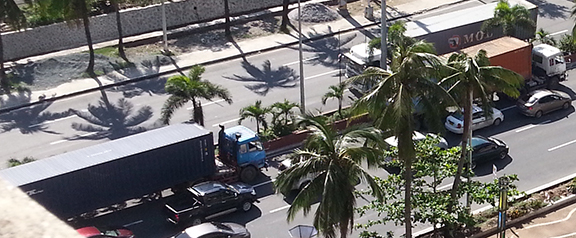The Confederation of Truckers Association of the Philippines (CTAP) is proposing several measures to ensure truckers’ compliance with the anti-overloading law.
In a position paper submitted to Public Works Secretary Mark Villar, CTAP reiterated its call to government to review its policies on overloading, and to “meet with industry proponents so that a solution viable to all would be reached.”
The position paper comes right before the moratorium on the implementation of Republic Act (R.A.) No. 8794 (An Act Imposing a Motor Vehicle User’s Charge on Owners of all Types of Motor Vehicle and for other Purposes), or Anti-Overloading Act, for truck codes 12-2 and 12-3 is set to expire on December 31, 2017.
After the law’s revised implementing rules and regulations (IRR) were issued in 2013, the provision enforcing rules on trucks under codes 12-2 and 12-3, which are commonly used to carry Philippine cargoes, has yet to come to pass with successive moratoriums always issued by the government on request of truckers.
Code 12-2 trucks are semi-trailers with three axles on the towing trucks and two axles on the trailer, for a total of 18 wheels, while trucks with the 12-3 configuration are semi-trailers with three axles on the towing vehicle and three axles on the trailer, for a total of 22 wheels.
In its position paper, CTAP said it recognizes the noble intentions of R.A. 8794. However, majority of truckers are “not financially ready to purchase new trailer units” due to the economic slowdown and spiralling cost of trucking operations.
The group also pointed out that the current maximum allowable gross vehicle weight (MGVW) for codes 12-2 and 12-3 under the revised IRR “failed to consider that the average weight of containers arriving in the Philippines is around 30,000 to 36,000 kg.”
If the minimum weight is added to the tare weight of the tractor head and trailer, which averages 15,000 kg, the total weight would be 43,500 kg, which is an automatic violation of the law, CTAP explained.
The confederation also noted that to comply with the MGVW, “we would need a truck and trailer with a tare weight of around 10,000 kg to 11,500 kg, which would be impossible since the average tare weight of such is 15,000 kg for code 12-2 and 16,000 kg for code 12-3.”
It added that even if truckers acquired equipment in compliance with the law but the MGVW for codes 12-2 and 12-3 remains the same, “the problem of overloading will still persist.”
As a result, CTAP is asking the Department of Public Works and Highways (DPWH) to consider amending the maximum allowable GVW for code 12-2 from 41,500 kg to 53,500 kg, and for code 12-3 from 42,000 kg to 54,000 kg.
The group noted that the proposed increases would be the same weight if the basis of apprehension remains 13.5 tons per axle on codes 12-2 and 12-3.
CTAP said its proposed amendment of the MGVW for codes 12-2 and 12-3 will help truckers comply with the law, and do away with the repeat moratoriums.
The confederation is also proposing the mandatory weighing of cargoes inside port premises, and the honoring or recognizing of results “in order that overloaded container cargo that exceeds the maximum weight shall not be permitted to exit the port premises.”
CTAP noted that to date, no mandatory weighing of container cargoes is conducted within the ports before the cargoes leave.
The group said that if the MGVW for codes 12-2 and 12-3 is implemented, 80% of containers coming from the Manila port “could no longer be transported which would put to naught the effort of the government to facilitate a seamless and sustainable mobility of container cargoes at the Port of Manila.”
CTAP is set to meet with DPWH on December 20 regarding the position paper. – Roumina Pablo






